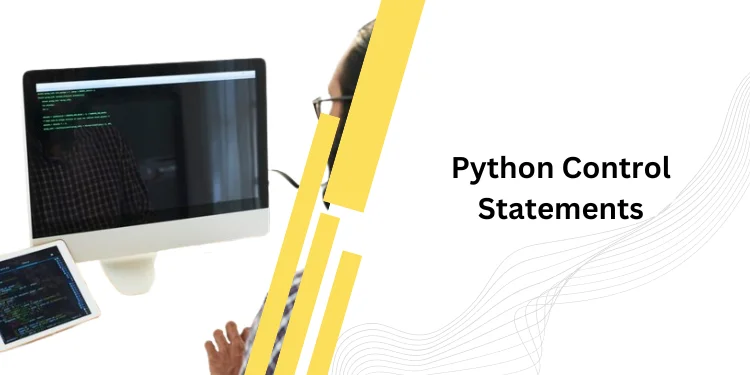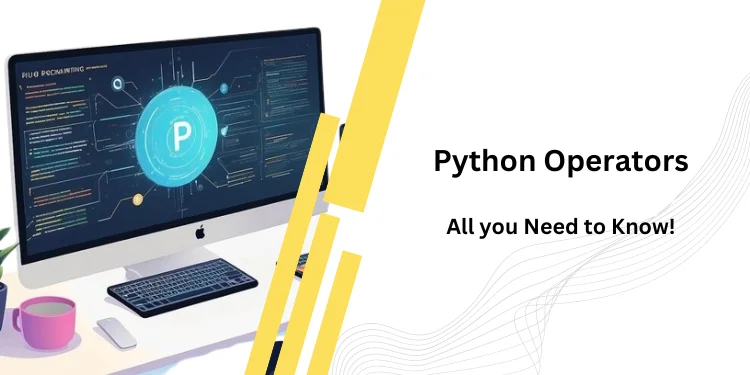Overview of Listening Skills
Have you ever considered what it takes to communicate effectively? Many people believe that simply speaking clearly is sufficient. But consider this: who would listen if everyone was just talking?
Richard Branson is a well-known mascot for the art of listening skills. Yes, the Virgin Group’s colorful founder is a strong believer in ‘listening skills.’
“Nobody ever learned anything by hearing themselves speak,” says Branson, adding that successful people often lose the ability to listen because they are “very fond of their own voices“
How would you feel if you were telling someone a specific experience and realized they weren’t trying to listen? You’re not likely to be happy. Listening skills are a crucial skill in learning English, as we all know. What if you’re unable to understand what’s being said? What will you do in this situation? This is why it is critical to have good listening skills abilities. To be able to respond appropriately, we must first listen and understand.
Unfortunately, many people are in this situation. The majority of people are poor listeners. They are excellent pretenders. True listening skills, on the other hand, involve more effort than most people are willing to put in. One of the most important abilities we can have is the ability to listen attentively. It is, really without a doubt, the key to better relationships in all aspects of your life, from personal to professional.
Introduction
In the communication process, listening skills refer to the ability to accurately receive and understand communications. Effective listening skills are essential for all forms of communication; without them, messages are readily misunderstood. One of the most important abilities you can have is the ability to listen. Listening skills not only improve your understanding and makes you a better communicator, but it also makes other people’s experience of speaking with you more enjoyable.
Good listeners usually seek to truly understand what others are trying to say, especially when the message is unclear. Listening skills require making an effort to decode and understand verbal and nonverbal signs such as voice tone, facial emotions, and bodily posture. Active listeners can demonstrate their interest in what they’re hearing by asking questions. If you do this, you will leave a good impression. Good listeners indicate to the speaker that they’re paying attention by using body language and other indicators. They also encourage and welcome other people’s ideas, opinions, and feelings.
Poor listening skills can lead to misunderstandings, resulting in conflict or disagreement. Excessive interruptions, inattention, hearing what you want to hear, mentally preparing a response, and having a closed mind are all possible causes.
5 Best ways to improve listening skills
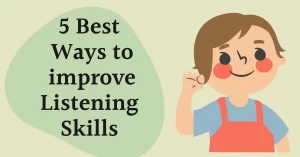
Listening with purpose and clarity helps to strengthen bonds. It improves empathy and prevents misunderstandings. Exercises in listening skills will help you become a better listener.
So, how do you know if you’re listening? We’ve put together a quick guide on five easy ways to enhance the listening skills that will assist you.
Active Listening
We often fail to pay attention to what the person in front of us is saying, as tragic as that may sound. Most of the time, we’re occupied with ourselves, thinking about what we’ll say in response. Even if you think you’re listening, you won’t be able to fully get what the other person is trying to convey.
Active listening shows your interest in the person speaking and that it is an important communication skill. Using active listening skills ensures that you grasp what is being spoken accurately.
Techniques for active listening include:
- To be able to communicate and share, rephrase what was said back to the speaker.
- Nonverbal gestures (nodding, eye contact, etc.)
- “I understand,” “I know,” “Thank you,” and so on) are verbal affirmations.
- Establishing rapport and showing concern
Non-Verbal Cues
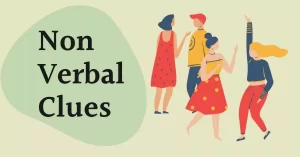
We never listen with our ears only. When people speak, they give out a lot of nonverbal cues. So pay attention to the speaker’s posture, tone of voice, pitch, and loudness, as well as whether or not he or she is uncomfortably shuffling from one foot to the other.
Nonverbal communication accounts for a lot of interpersonal communication. When someone talks, their eyes, lips, and shoulder position make it easy to identify boredom, enthusiasm, or annoyance on their face. As a result, listening also includes observing nonverbal signs. It assists you in making inferences based on what a person means when they speak to you.
Don’t Be Judgemental
Be attentive to whether you’re reacting to indicators like the speaker’s culture, gender, mannerisms, or even the emotional tone of what they’re saying as you’re listening to them talk. As a result, stop taking sides or forming opinions.
Listen without judging the person who is the speaker in your head while they are speaking. Avoid thinking about harsh or judgemental comments, even if the message makes you agitated or alarmed, because this will affect your scope to listen. You should also listen with an open mind and recognize that the speaker is sharing their point of view with you. As they continue to speak with you, you may notice that they make more sense, and you won’t know the whole narrative until unless you don’t listen.
To put it in other words, listen even if you don’t like what you’re hearing and who’s expressing it.
Remove distractions
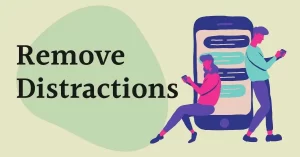
The first and most essential step is to eliminate any sources of distraction. Distractions can come in the form of your phone, laptop, or even food. When you’re talking to someone, it’s best to concentrate on them rather than on something else. Although it is rude to look at your phone while chatting to someone, it is sadly all too often. Get rid of the temptation and the distractions.
Use Body Language to Show You’re Listening
Empathize with the speaker by giving a facial response (smile at the good news, furrow your brow with concern, purse your lips to show your frustration, etc.) Nod once in a while.
About two-thirds of the time, maintain eye contact.
Try not to cross your arms while standing up straight (studies indicate you retain about 35 percent less information when you cross your arms)
However, avoid using forced body languages such as continuous eye contact or excessive head nodding. Fake listening is easy to detect and will put an end to the conversation fast. (Of course, it’s possible that was your intention all along!)
Which is Best Online Course: Becoming a Better Listener

Successful individuals, on the whole, are great listeners. Even in challenging or stressful situations, they are able to give others their entire attention so that they can know their needs an
d ask the proper questions. They can also effectively use their listening abilities to explain their own aims and form good relationships with others. In this course, you’ll learn about common listening beliefs, how to improve your listening abilities, and how to deal with hurdles to active listening.
This course begins with an overview of good listening skills, including what they are, why they are important, and how to improve them. The course teaches you how to identify your listening style, as well as basic listening abilities, barriers to listening, listening habits, body language, and activities to help you improve your listening skills. Physical characteristics, active listening, attitude, perception, prejudice, language difficulties, crucial gestures, and even how to take effective notes will all be covered.
DataTrained’s detailed Becoming a Better Listener course’s goal is to provide you with a deeper understanding of the listening skills as well as practical guidelines, approaches, and this course also explains how you can use this information with helping to learn good listening skills too.
By the time you complete this course, whether taking it for personal or professional reasons, you will know the direction you need to follow to improve your listening skills. Join us today at DataTrained and get mentor-ship in the field of Life skills with various such courses and change the perspective of your life. Get help from 50+ Trainers who will motivate you to succeed and drive your way to a better positive life.
Read more about it here: (Course link Becoming a Better Listener)
Conclusion
Active listening is a good communication model. Remember that listening is about gaining perspective and understanding, not merely gathering information and sharing thoughts. Active listening takes time and work to master, and it’s a habit that must be maintained.
Remind yourself that the purpose of the conversation is to fully grasp what the other person is saying and to be understood in return. Your listening habits can have an impact on all aspects of your life, including your individual connections and career.
Listening involves paying attention not only to the story-line itself but also to how it is told, including the use of language and voice, as well as the other person’s body language. To put it another way, it involves being attentive to both verbal and nonverbal cues. The degree to which you perceive and understand this information determines your capacity to listen properly.








